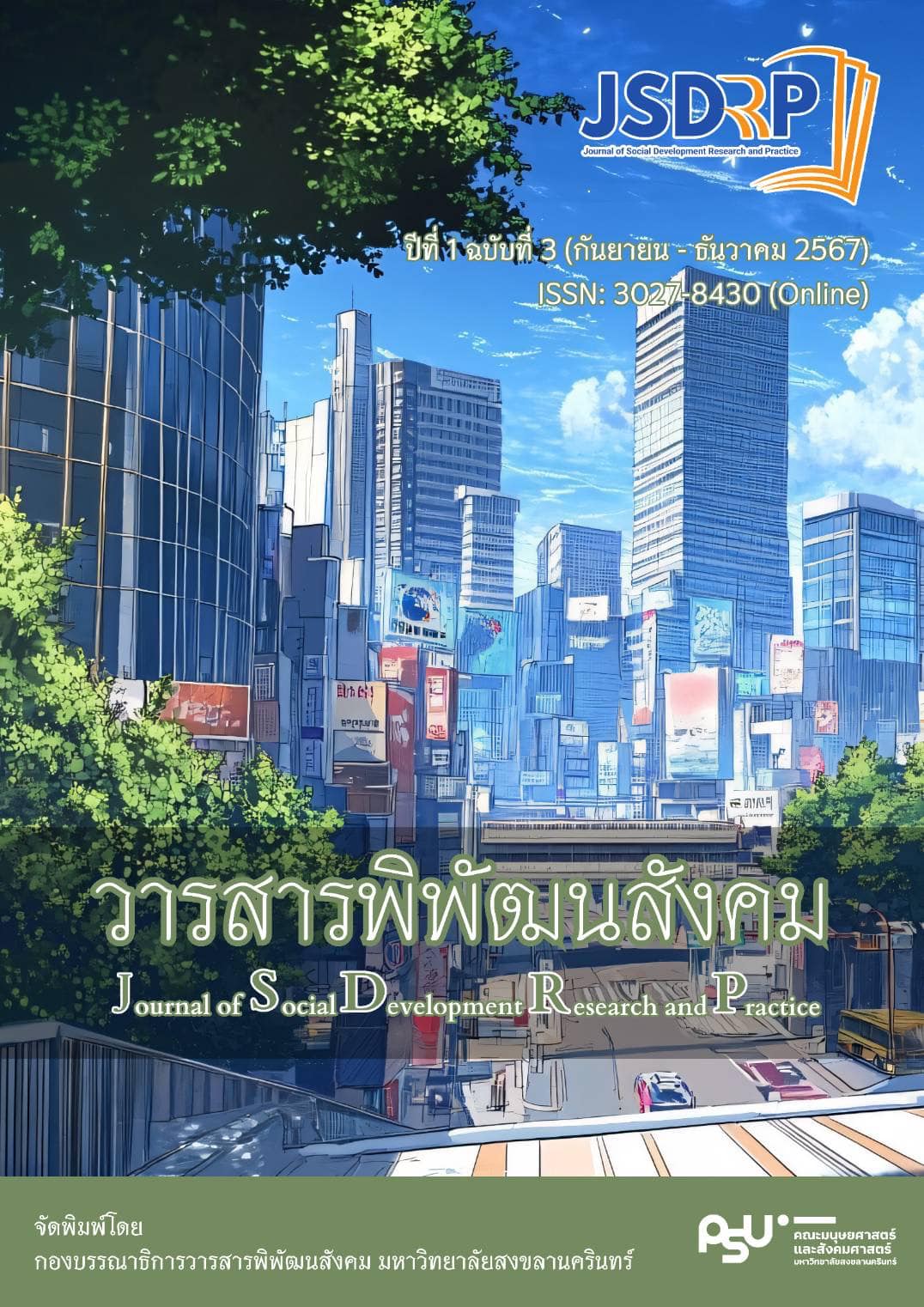Widowed Women in Pattani: The Impact on Early-Stage Resilience and Coping with Loss
Keywords:
Resilience, Widows, Coping with LossAbstract
Purpose: This article is part of a thesis study aiming to explore the resilience process of widows affected by the unrest in Pattani province. It seeks to present the findings of the resilience process in the first and second stages.
Methodology: This is a qualitative study employing in-depth interviews and observations with key informants, specifically widows who lost their husbands due to fatalities caused by unrest. The study adopts a grounded theory approach to data analysis.
Findings: The first stage, widows initially face grief and stress following the loss, requiring medical and familial support during the initial “shock” phase. The emotional resilience recovery process is gradual, with many widows drawing strength from religious beliefs and family support to navigate this phase, while some require psychiatric therapy to restore mental well-being. In the second stage, widows enter a stage of acceptance, adapting to the new circumstances while seeking ways to maintain morale and resolve personal challenges.
Applications of this study: Key recommendations from the study include: (1) elevating support for affected individuals as a national agenda, urging all sectors of society to recognize and address the issue, and promoting both public and private sectors to jointly advance integrated support for economic, mental health, and social care; (2) developing a social safety network system by supporting widows through long-term partnerships with public and private sectors, creating comprehensive support networks and fostering economic security through sustainable employment opportunities and skill training; and (3) enhancing mental health support mechanisms by providing accessible mental health assistance teams to closely support widows, reducing stress and social isolation.
References
กรมสุขภาพจิต. (2552). 5 เรื่องน่ารู้เกี่ยวกับ RQ. กรุงเทพฯ: กรมสุขภาพจิต สำนักพัฒนาสุขภาพจิต.
กรมสุขภาพจิต. (2563). คู่มือสร้างสรรค์พลังใจให้วัยทีน. พิมพ์ครั้งที่ 2. กรุงเทพฯ: กองส่งเสริมและพัฒนาสุขภาพจิต กรมสุขภาพจิต.
กรวิกา บวชชุม, วินีกาญจน์ คงสุวรรณ, และวันดี สุทธรังสี. (2560). การดูแลตนเองทางด้านจิตใจของสตรีหม้ายจากสถานการณ์ความไม่สงบจังหวัดชายแดนภาคใต้: รายงานการศึกษาเบื้องต้น, วารสารพยาบาลสงขลานครินทร์, 37(1), 97-104.
คุณานนท์ ยาแลหลา, ปาหนัน บัวสาม และธันยา รุจิเสถียรทรัพย์. (2566). การฟื้นคืนความเข้มแข็งของสตรีหม้ายภายใต้การหนุนเสริมของบริบทสังคมชายแดนใต้ กรณีศึกษาจังหวัดปัตตานี. ใน การสัมมนาทางวิชาการเนื่องในวันสถาปนาคณะสังคมสงเคราะห์ศาสตร์ครบรอบ 69 ปี “เปลี่ยนสู่วิถีใหม่ของการปฏิรูปความห่วงใยดูแลสังคม”. (น. 212-231). กรุงเทพฯ: คณะสังคมสงเคราะห์ศาสตร์ มหาวิทยาลัยธรรมศาสตร์.
ดวงหทัย บูรณเจริญกิจ. (2564). สถานการณ์เด็ก เยาวชน และผู้หญิงในจังหวัดชายแดนภาคใต้. ยะลา: ศูนย์ประสานงานด้านเด็กและสตรีในจังหวัดชายแดนภาคใต้.
เดอะ แอคทีพ. (2564). 17 ปี เด็กและผู้หญิง แบกบาดแผลความรุนแรงชายแดนใต้. สืบค้นเมื่อ 5 พฤศจิกายน 2565 จาก https://theactive.net/data/women-and-children-in-the-south-border-of-thailand
ธันยา รุจิเสถียรทรัพย์. (2565). แนวคิดและทฤษฎีสวัสดิการเด็ก. กรุงเทพฯ: คณะสังคมสงเคราะห์ศาสตร์ มหาวิทยาลัยธรรมศาสตร์.
เนตรชนก สุนา. (2556). เจตคติของคนพิการต่อการเสริมสร้างพลังอำนาจ (วิทยานิพนธ์สังคมสงเคราะห์ศาสตรมหาบัณฑิต สาขาการบริหารและนโยบายสวัสดิการสังคม). กรุงเทพฯ: มหาวิทยาลัยธรรมศาสตร์.
ประเวช ตันติพิวัฒนสกุล. (2550). แนวทางการจัดกิจกรรมการเรียนรู้เพื่อสร้างความเข้มแข็งทางใจสำหรับนักเรียนชั้นมัธยมศึกษา. กรุงเทพฯ: สำนักงานพัฒนาสุขภาพจิต.
มนวัธน์ พรหมรัตน์, ทวีลักษณ์ พลราชม และอัมพร หมาดเด็น. (2558). การเป็น “สตรีหม้าย” กับ ความรุนแรงเชิงวัฒนธรรมและโครงสร้างในพื้นที่สามจังหวัดชายแดนภาคใต้. วารสารมนุษยศาสตร์สังคมศาสตร์ปริทัศน์ คณะมนุษยศาสตร์และสังคมศาสตร์ มหาวิทยาลัยราชภัฏลำปาง, 3(2), 93-119.
มาดี ลิ่มสกุล. (2564). แนวคิดและทฤษฎีพฤติกรรมมนุษย์. กรุงเทพฯ: คณะสังคมสงเคราะห์ศาสตร์ มหาวิทยาลัยธรรมศาสตร์.
ศรีสมภพ จิตร์ภิรมย์ศรี. (2560). ความขัดแย้งชายแดนใต้ในรอบ 13 ปี: ความซับซ้อนของสนามความรุนแรงและพลังของบทสนทนาสันติภาพปาตานี. สืบค้นเมื่อ 27 ธันวาคม 2566 จาก https://deepsouthwatch.org/th/node/11053
ศูนย์เฝ้าระวังสถานการณ์ชายแดนใต้. (2564). สรุปเหตุการณ์ในพื้นที่จังหวัดชายแดนภาคใต้ ประจำเดือนกันยายน 2564. สืบค้นเมื่อ 5 มกราคม 2566 จาก https://deepsouthwatch.org/th/node/12812
สถานวิจัยความขัดแย้งและความหลากหลายทางวัฒนธรรมภาคใต้. (2558). การประเมินสถานการณ์ของผู้ชายและเยาวชนชายในพื้นที่ขัดแย้งชายแดนใต้ของประเทศไทย. ปัตตานี: มหาวิทยาลัยสงขลานครินทร์.
สำนักงานพัฒนาสังคมและความมั่นคงของมนุษย์จังหวัดปัตตานี. (2564). รายงานสถานการณ์ทางสังคมจังหวัดปัตตานี ประจำปี 2564. ปัตตานี: ปัตตานีอินโฟ.
สุวรา แก้วนุ้ย. (2565). ความเป็นอยู่ที่ดีทางสังคมของสตรีที่ได้รับผลกระทบจากสถานการณ์ความไม่สงบในพื้นที่จังหวัดชายแดนภาคใต้ ภายใต้สถานการณ์โควิด-19. ใน การสัมมนาทางวิชาการเนื่องในวันสถาปนาคณะสังคมสงเคราะห์ศาสตร์ครบรอบ 68 ปี “ทางเลือกและทางรอด: การปรับตัวภายใต้การเปลี่ยนแปลงของโลกยุคใหม่”. (น. 30-50). กรุงเทพฯ: คณะสังคมสงเคราะห์ศาสตร์ มหาวิทยาลัยธรรมศาสตร์.
หริรักษ์ แก้วกับทอง. (2554). ประสบการณ์ทางจิตใจของหญิงม่ายจากเหตุการณ์ความไม่สงบในจังหวัดชายแดนภาคใต้ (วิทยานิพนธ์ปริญญามหาบัณฑิต สาขาจิตวิทยา). กรุงเทพฯ: จุฬาลงกรณ์มหาวิทยาลัย.
American Psychological Association. (2019). Single Parenting and Today’s Family. Retrieved 25 November 2023, from https://www.apa.org/topics/parenting/single-parent
Becker, G.S. (1976). The Economic Approach to Human Behavior. Chicago: University of Chicago Press.
Bronfenbrenner, U. (1979). The Ecology of Human Development: Experiments by Nature and Design. Massachusetts: Harvard University Press.
Connor M.K., & Davidson R.T.J. (2003). Development of anew resilience scale: The Corner – Davidson Resilience scale (CD-RISC). Depression & Anxiety, 18(1), 76-82.
Durkheim, É. (1951). Suicide: A study in sociology. Glencoe, IL: Free Press.
Dyer, J.G., & McGuinness, T.M. (1996) Resilience: Analysis of the concept. Archives of Psychiatric Nursing, 10(1), 276-282.
Grotberg, E.H. (1995). A guide to promoting resilience in children: Strengthening the human spirit. Retrieved 25 November 2023, from https://bibalex.org/baifa/attachment/documents/115519.pdf
Wolin, S.J, & Wolin, S. (1993). The resilience self: how survivors of trouble family Rise above Adversity. New York: Villard Books.
World Health Organization. (2004). Promoting mental health: Concepts, emerging evidence, practice (Summary Report). Retrieved 25 November 2023, from https://iris.who.int/bitstream/handle/10665/43286/9241562943_eng.pdf?sequence=1
Zimmerman, M.A. (1995). Psychological empowerment: Issues and illustrations. American Journal of Community Psychology, 23(5), 581–599.
Downloads
Published
How to Cite
Issue
Section
License
Copyright (c) 2024 Journal of Social Development Research and Practice

This work is licensed under a Creative Commons Attribution-NonCommercial-NoDerivatives 4.0 International License.
This work is licensed under a Creative Commons Attribution-NonCommercial-NoDerivatives 4.0 International License.





